re you a startup looking to gain an edge in the modern business market? If so, then building your success using SaaS applications could be beneficial. Software-as-a-service (SaaS) is one of the most efficient ways to tap into cutting edge technology and leverage it for maximum gains. From increasing revenue to streamlining processes, there are countless opportunities available when utilizing SaaS applications as part of a comprehensive business strategy. In this blog post, we will discuss how growing startups can take advantage from start to finish!
There are many reasons why Software as a Service (SaaS)applications are becoming increasingly popular. For starters, SaaS applicationsare accessible from anywhere with an internet connection, meaning thatbusinesses can manage their operations and access important data from theconvenience of their own office or from remote locations. It is easier toprovide customer support for SaaS applications since customer details andpreferences are stored in the cloud. SaaS applications provide anout-of-the-box experience, making it easier and simpler for companies to usethem without having to invest in complex technology or maintain servers.
Here are some reasons why SaaS (Software as a Service) applications are becoming increasingly popular:
Cost-effectiveness: SaaS applications are generally less expensive than traditional software solutions, as they do not require large upfront investments in hardware or software. Instead, users pay a monthly or yearly subscription fee, which can be adjusted according to the organization's needs and size.
Scalability: SaaS applications can be easily scaled up or down, depending on the organization's requirements. This means that organizations can quickly and easily increase or decrease their usage of the software, without having to worry about hardware or infrastructure constraints.
Accessibility: SaaS applications can be accessed from any device with an internet connection, making them incredibly convenient for users. This accessibility also means that users can access the software from any where, at any time, which is particularly useful for remote workers and geographically dispersed teams.
Easy maintenance and updates: With SaaS applications, the software vendor is responsible for maintaining and updating the software. This means that users don't have to worry about keeping the software up to date or maintaining it themselves, which can be a significant burden for IT departments.
Integration with other applications: Many SaaS applications can be easily integrated with other software applications, which can be particularly useful for organizations that use multiple software applications to manage different aspects of their business.
Security: SaaS applications are generally more secure than traditional software solutions, as they are typically hosted on secure servers with robust security protocols in place. This can help organizations to better protect their data and avoid security breaches.
Customization: SaaS applications can be customized to meet the specific needs of an organization. This means that organizations can tailor the software to their requirements, without having to worry about developing and maintaining custom software solutions in-house.
Importance of SaaS applications for startups
For startups, the development and implementation of an effective software solution is essential for success. Fortunately, thanks to the emergence of Software-as-a-Service(SaaS) applications, the difficulty of this task can be greatly reduced. With SaaS applications, startup teams no longer have to spend time or resources creating individualized user experiences, eliminating lengthy customizations and configurations in favor of rapid installation. Plus, automatic updates ensure that important security patches are applied quickly and without disruption; a key advantage when running a business on a tight budget. Furthermore, as software subscriptions generally only require payments based off usage or units deployed, they provide startups with improved financial scalability while enabling access to powerful enterprise grade solutions without significant investments. Undoubtedly SaaS applications offer many advantages to entrepreneurs and their businesses on any budget; small wonder then that savvy startups make use of this extremely beneficial technology.
Types of SaaS applications for Startups
· Customer Relationship Management(CRM) software: This type of SaaS application helps startups to manage their customer interactions and relationships.
· Human Resource Management (HRM)software: SaaS HRM software can assist startups to streamline their employee on boarding, payroll, benefits administration, and other HR-related tasks.
· Project Management software: SaaS project management tools enable startups to plan, organize, and execute their projects effectively.
· Accounting software: SaaS accounting software can help startups to manage their finances, including invoicing, tracking expenses, and managing accounts payable and receivable.
· Marketing automation software: SaaS marketing automation software can assist startups in managing their marketing campaigns, email campaigns, social media campaigns, and lead generation.
· Sales automation software: SaaS sales automation software can help startups to automate their sales process, manage their sales pipeline, and track their sales performance.
· Collaboration software: SaaS collaboration software can help startups to collaborate on projects, share files, and communicate with team members.
· Content Management System (CMS)software: SaaS CMS software can assist startups to manage their website content, blog posts, and other digital content.
· Customer Support software: SaaS customer support software can help startups to provide excellent customer service and support through various channels.
· E-commerce software: SaaS e-commerce software can enable startups to create and manage their online store, including inventory management, order processing, and payment processing.
· Learning Management System (LMS)software: SaaS LMS software can assist startups to create and manage their online training programs and courses.
· Social Media Management software: SaaS social media management software can help startups to manage their social media accounts, schedule posts, and track engagement.
· Business Intelligence (BI) software: SaaS BI software can help startups to analyze their business data, identify trends and insights, and make informed decisions.
· Email Marketing software: SaaS email marketing software can help startups to create and send email campaigns, segment their audience, and track their email marketing performance.
· Customer Feedback software: SaaS customer feedback software can assist startups to collect and analyze customer feedback, measure customer satisfaction, and improve their products and services.
With numerous SaaS solutions available on the market, it can be difficult to decide what's best for your business. To make matters worse, each solution comes with its own set of benefits and we have to consider our individual needs when choosing what’s right for us. That being said, not every consideration needs to seem daunting or overwhelming – by taking time to understand the different factors that come into play when selecting the perfect SaaS solution, you will find yourself much closer to making an informed decision
There are several factors to consider when choosing a Software-as-a-Service (SaaS) application, including:
· Functionality: Consider whether the SaaS application meets your specific business needs and requirements. Evaluate the features and functionality of the application and make sure it aligns with your business goals.
· User interface: The SaaS application should have an intuitive and easy-to-use interface that is user-friendly for all employees who will be using it.
· Security: The security of your data is crucial. Look for SaaS applications that have strong security measures in place, such as data encryption, multi-factor authentication, and regular security audits.
· Reliability and uptime: Ensure that the SaaS application has a high level of uptime and reliability. It should be available whenever you need it and able to handle the expected amount of traffic.
· Integration capabilities: Consider whether the SaaS application can integrate with other tools and systems you are already using, such as your customer relationship management (CRM) or enterprise resource planning (ERP) system.
· Scalability: Determine whether the SaaS application can grow and scale with your business. It should be able to handle an increase in users and data without any issues.
· Pricing: Evaluate the pricing model of the SaaS application and make sure it fits within your budget. Look for any hidden costs or fees that may impact your overall cost.
· Support: Consider the level of support the SaaS application provider offers. They should have a dedicated support team available to assist with any issues or questions that arise.
As a startup business owner, taking the right steps to secure your SaaS based applications is vital for protecting important data and ensuring you have the resources necessary to grow.
The first step towards achieving this is - conducting a needs assessment; this will help identify which features, capabilities, security protocols and support services are essential for your company.
Once you have determined what your business needs, select a provider with a proven track record as reliability is key. It is also essential to create a systematic approach for data management and backup so that any valuable information can be archived or restored.
Furthermore, implement training programmers to educate those who are operating within the company about how to use the SaaS application correctly and safely.
Finally, it’s important to monitor and evaluate performance on an ongoing basis in order to provide feedback on successful strategies as well as identify areas where improvements need to be made.
By following these best practices, businesses will have peace of mind knowing their SaaS applications are running smoothly and securely.
Top SaaS Tools
Project Management
1. ProProfs Project

ProProfs Project is a cloud-based project management software designed to help businesses of all sizes manage their projects more efficiently. It offers features such as task management, team collaboration, project tracking, reporting, and more. ProProfs as a company was founded in 2010by Sameer Bhatia, a software engineer and entrepreneur.
With ProProfs Project, you can create and assign tasks toteam members, set deadlines, track progress, and receive real-time notificationswhen tasks are completed. You can also collaborate with team members by sharingfiles, comments, and feedback on tasks.
One of the key benefits of ProProfs Project is itsuser-friendly interface, which makes it easy to use for both team members andmanagers. The software also offers customizable templates for various projecttypes, including marketing campaigns, product launches, and more.
ProProfs Project is available as a web-based application and can be accessed from anywhere with an internet connection. It also offers integrations with popular tools such as Google Drive, Dropbox, and Slack.
Pricing

2. Proof Hub

ProofHub is a web-based project management and collaboration tool that helps teams to plan, organize, collaborate, and deliver projects on time. It was founded in 2011 by Sandeep Kashyap, and it has become a popular choice for businesses of all sizes, from small startups to large corporations.
Some of the key features of ProofHub include project management tools, such as task lists, Gantt charts, and time tracking, as well as collaboration features like online proofing and feedback, document sharing, and team communication. It also offers integrations with popular tools such as Google Drive, Dropbox, and OneDrive.
ProofHub is known for its user-friendly interface and intuitive design, which makes it easy for team members to navigate and use the platform. Additionally, it provides customizable user roles and permissions, so that team members can be granted access to specific projects and tasks based on their roles and responsibilities.
Pricing

3. Asana

Asana helps teams organize and track their work. It was founded in 2008 by Dustin Moskovitz and Justin Rosenstein, who were early employees of Facebook and Google respectively.
Asana allows users to create projects, assign tasks to team members, set deadlines, and track progress. It also features collaboration tools such as team communication, file sharing, and project commenting.
Asana is used by teams of all sizes, from small startups to large corporations. It is available in both free and paid versions, with additional features and support offered in the paid plans. Asana has received positive reviews for its user-friendly interface, ease of use, and powerful project management capabilities.
Pricing

Content Management System
4. HubSpot
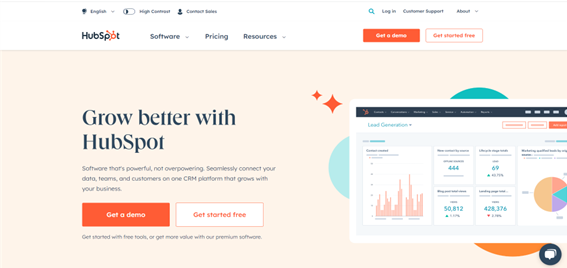
HubSpot is a leading inbound marketing, sales, and customer service software platform that was founded in 2006 by Brian Halligan and Dharmesh Shah. The company is based in Cambridge, Massachusetts, USA.
HubSpot's software helps businesses to attract, engage, and delight their customers by providing a suite of tools for content creation, search engine optimization, social media, email marketing, lead management, and customer relationship management. HubSpot's platform is designed to enable businesses to create a seamless and personalized experience for their customers across all touchpoints.
HubSpot's inbound marketing methodology focuses on attracting, engaging, and delighting customers through valuable content and experiences, rather than interruptive advertising. This approach has helped many businesses to generate leads and grow their customer base.
In addition to its software platform, HubSpot offers a range of educational resources and certifications to help businesses learn more about inbound marketing and improve their skills. The company also has a strong community of users and partners who share best practices and support each other.
it has received high praise from industry experts and is ranked as one of the best inbound marketing platforms in the world – making it an easy choice for any business trying to maximize their success in the digital market place.
Pricing

5. WordPress

WordPress is a popular open-source content management system(CMS) that allows users to create and manage websites. It was founded in 2003by Matt Mullenweg and Mike Little.
A WordPress SaaS application allows users to create andmanage their websites without having to install or maintain any software.Instead, users can access the application through their web browser and use itto create and manage their websites.
WordPress SaaS applications are often a good choice for small businesses and individuals who want to create a website without having toinvest in web hosting or other technical infrastructure. However, they may not be suitable for larger businesses or organizations that require more control over their website's infrastructure and security.
Pricing

6. Drupal

Drupal was invented by Dries Buytaert in 2001. Buytaert initially developed Drupal as a message board for his friends, but he eventually decided to release it as open-source software. Since then, Drupal has evolved into a robust content management system used by organizations of all sizes around the world.
Drupal is an open-source content management system (CMS)that is used around the world to create websites, applications and digital experiences. It is powered by a community of developers and supporters who continually contribute to its growth.
Drupal's easy-to-use administrative interface allows users to quickly create resources such as blogs, forums, calendars and media galleries for their website. Furthermore, a wide array of modules and themes provides developers with the flexibility to customize their projects in nearly any way they can imagine. Whether you're looking to launch your own business website or develop a complex web application, Drupal offers users the power and freedom to bring their visions to life.
To develop a SaaS application with Drupal, you will need tochoose a hosting provider that supports Drupal and offers the necessary resourcesfor your application. You will also need to customize Drupal to meet thespecific needs of your application, which may involve creating custom modulesor integrating with third-party tools and services.
Overall, Drupal is a flexible and powerful platform for developing SaaS applications, and its community of developers and users can provide valuable support and resources for your project.
Pricing

7. Wix

Wix is a cloud-based website development platform that provides a drag-and-drop website builder and a variety of other tools and services to help businesses and individuals create professional-looking websites without any coding knowledge.
Wix was founded in 2006 by Avishai Abrahami, Nadav Abrahami, and Giora Kaplan. They were all friends who had previous experience in building software and wanted to create a platform that would make it easy for anyone to build a website. Today, Wix has become one of the leading website builders in the world, with millions of users and a range of features that continue to expand and evolve.
Pricing

8. Contentful

Contentful is a Software-as-a-Service (SaaS) content management system (CMS) that allows businesses and organizations to manage digital content across multiple platforms and devices. It is a cloud-based platform that provides a centralized hub for content creation, editing, and publishing.
Some of the key features of Contentful include a user-friendly interface, flexible content modeling, robust API, and powerful search capabilities. The platform also offers integrations with popular tools and services like Slack, Salesforce, and Google Analytics.
Contentful is designed to support various types of content, including text, images, videos, and other multimedia formats. It can be used for a wide range of applications, including website and app development, e-commerce, marketing, and more.
One of the main advantages of Contentful is its scalability, which makes it suitable for both small and large organizations. It also offers a free trial period for users to test the platform before committing to a paid subscription.
Pricing

Customer Support
9. Zendesk

Zendesk provides customer service and engagement software solutions for businesses. It is a cloud-based customer service platform that offers a range of tools and features to help businesses improve customer support and engagement.
It was founded in 2007 by three entrepreneurs from Denmark: Mikkel Svane, Morten Primdahl, and Alexander Aghassipour.
Some of the key features of Zendesk include:
· Ticket management: Zendesk provides an easy-to-use ticketing system that allows businesses to manage customer inquiries and requests more efficiently.
· Multichannel support: Zendesk enables businesses to provide support across multiple channels, including email, phone, chat, social media, and more.
· Self-service support: Zendesk provides a range of self-service options, including knowledgebase articles and community forums, to help customers find answers to their questions quickly and easily.
· Analytics and reporting: Zendesk offer advanced analytics and reporting tools that enable businesses to track key performance metrics and identify areas for improvement.
· Integrations: Zendesk integrates with a range of third-party apps and tools, including CRM software, marketing automation platforms, and more.
Overall, Zendesk is a powerful customer service platform that can help businesses improve customer engagement and support. Its intuitive interface and wide range of features make it a popular choice for businesses of all sizes.
Pricing

10. Salesforce Service Cloud

Salesforce Service Cloud is a SaaS (Software-as-a-Service)application developed by Salesforce that allows businesses to manage and automate their customer service operations. It is a cloud-based platform that provides a wide range of features and tools to help businesses deliver exceptional customer service.
Some of the key features of Salesforce Service Cloud include:
· Case Management: Allows businesses to track and manage customer service cases from creation to resolution.
· Knowledge Base: Provides a central repository for storing and sharing information with customers and employees.
· Live Chat: Enables businesses to offer real-time support to customers via chat.
· Social Media Integration: Allows businesses to monitor and respond to customer inquiries and comments on social media platforms.
· Reporting and Analytics: Provides insights into customer service performance and trends to help businesses improve their operations.
Salesforce Service Cloud is highly customizable, and businesses can tailor the platform to meet their specific needs. Additionally, it integrates with other Salesforce products, such as Sales Cloud and Marketing Cloud, to provide a complete CRM (Customer Relationship Management) solution.
Pricing

11. Zonka Feedback
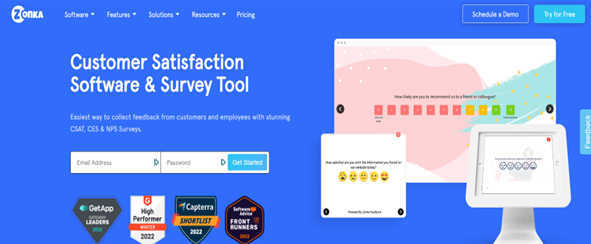
Zonka Feedback is designed to help businesses collect feedback from their customers and users. It provides an intuitive and intelligent platform for creating and deploying surveys that can be embedded within products or apps. Zonka Feedback enables businesses to collect real-time feedback, analyze and interpret it using advanced analytics and reporting tools, and take action on the insights gained from the feedback.
The tool offers a range of survey question types, including multiple-choice, rating scales, open-ended questions, and more, that can be customized to meet specific business needs. It also provides various survey distribution channels, such as email, SMS, and web links, to reach a wider audience.
Zonka Feedback's analytics and reporting features provide real-time insights into customer feedback, including sentiment analysis, customer satisfaction scores, and other metrics. These insights help businesses understand customer preferences and identify areas for improvement, leading to better product development, increased customer retention, and improved customer experience.
Pricing

Social Media management
12. Hootsuite

Hootsuite allows individuals and businesses to manage multiple social media accounts and schedule posts in advance. The platform supports various social media networks such as Facebook, Instagram, Twitter, LinkedIn, YouTube, and others.
Hootsuite provides a range of features, including a dashboard that allows users to monitor their social media accounts in one place, content scheduling and publishing, social media analytics and reporting, and team collaboration tools. It also provides various third-party app integrations, allowing users to expand their social media management capabilities.
Hootsuite is widely used by social media managers, marketers, and businesses of all sizes to streamline their social media management tasks and improve their social media presence. The platform offers different pricing plans, ranging from a free plan to more advanced plans with additional features and capabilities.
Pricing

13. Buffer

Buffer is a popular social media management tool that allows businesses and individuals to manage their social media presence more effectively. With Buffer, users can schedule posts for multiple social media platforms in advance, track engagement and analytics, and collaborate with team members. Buffer's scheduling feature is particularly useful for startups and small businesses who may not have the resources to manage social media accounts in real-time.
Buffer is founded by Joel Gascoigne and Leo Widrich in 2010.
The tool’s ability to monitor tags and mentions can help businesses stay on top of their online reputation and engage with customers more efficiently. Overall, Buffer can be a valuable tool for startups and businesses looking to streamline their social media strategy and improve their online presence.
Pricing
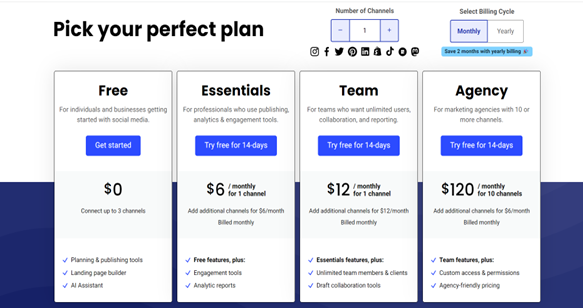
14. Sprout Social

Sprout Social is a social media management and optimization platform that was founded in 2010 by Justyn Howard, Aaron Rankin, and Gilbert Lara.
Sprout Social provides businesses with the ability to monitor and analyze their social media performance, track brand mentions and customer interactions, and measure the impact of their social media marketing efforts. It also offers advanced features like audience targeting, competitor analysis, and social listening, allowing businesses to gain valuable insights into their audience and the wider social media landscape.
Pricing

Email Marketing
15. ActiveCampaign

The company was founded in 2003 by Jason VandeBoom and is based in Chicago, Illinois, USA.
ActiveCampaign is a cloud-based marketing automation software company that provides businesses with a comprehensive set of tools for customer engagement, email marketing, marketing automation, and sales automation. The platform is designed to help businesses of all sizes create and execute targeted and personalized marketing campaigns that drive engagement, increase customer loyalty, and generate sales.
ActiveCampaign is a popular choice for businesses looking to streamline their marketing and sales processes and increase their customer engagement and revenue. The platform is known for its ease of use, powerful features, and affordable pricing, making it accessible to businesses of all sizes.
Pricing

16. Mailchimp
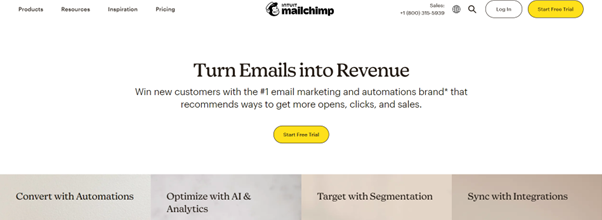
MailChimp is a popular SaaS email marketing tool that provides a wide range of features for businesses to manage their email marketing campaigns effectively. With MailChimp, businesses can create and send personalized emails to their subscribers, automate email campaigns, and track their performance with analytics tools.
MailChimp also offers AI-powered features like product recommendations and send time optimization, which can help businesses increase engagement and conversions. Additionally, MailChimp integrates with other popular tools and platforms like social media platforms, e-commerce platforms, and CRM software, making it a versatile solution for businesses of all sizes.
It was founded in 2001 and has since grown to become one ofthe most popular email marketing tools in the world.
Pricing

17. Campaign Monitor

Campaign Monitor allows businesses and organizations to create, send, and optimize email campaigns. The platform provides a variety of features and tools, such as drag-and-drop email builders, customizable templates, segmentation and personalization options, A/B testing, analytics and reporting, and integrations with other marketing tools like Salesforce, Shopify, and WordPress.
Campaign Monitor aims to help businesses of all sizes build strong relationships with their subscribers and customers through effective email marketing. The platform offers flexible pricing plans based on the number of subscribers, as well as a free trial period for users to test out the features before committing to a paid subscription.
In addition to email marketing, Campaign Monitor also offers a range of other marketing automation features, such as drip campaigns, lead generation forms, and landing pages, to help businesses streamline their marketing efforts and drive conversions.
Pricing

Digital Marketing & SEO
18. Semrush

Semrush is a digital marketing tool that was founded in 2008by Oleg Shchegolev and Dmitry Melnikov. The tool provides a variety of featuresincluding keyword research, competitor analysis, backlink analysis, and more,which can help businesses improve their online visibility and drive moretraffic to their websites. SEMrush has become a popular tool among digitalmarketers and SEO professionals, and is used by businesses of all sizes toimprove their online marketing efforts.
Pricing

19. Ahrefs

Ahrefs is a popular SEO toolset used by digital marketer sand SEO professionals to analyze website performance, monitor backlinks, and conduct keyword research. It was founded in 2010 by Dmitry Gerasimenko, who currently serves as the CEO of the company.
Dmitry Gerasimenko, a Ukrainian entrepreneur, started the company after struggling to find a tool that would allow him to analyze his competitors' backlinks. He began developing Ahrefs as a small project but eventually realized its potential and turned it into a full-fledged business.
Pricing

20. Moz

Moz is a software company that provides SEO (search engine optimization) tools and services. It was founded in 2004 by Rand Fishkin and Gillian Muessig, initially as a consulting company called SEOmoz. The company was later renamed Moz to reflect its broader focus on digital marketing beyond just SEO.
Moz's flagship product is Moz Pro, which offers a suite of tools for SEO analysis, keyword research, link building, and other aspects of digital marketing. The company also offers a range of free tools, including MozBar (a browser extension for SEO analysis) and Open Site Explorer (a tool for analyzing backlinks).
Moz has become a well-known name in the SEO industry, and its products are used by businesses and digital marketers around the world to improve their search engine rankings and online visibility.
Pricing

Human Management
21. Microsoft SharePoint HRMS

Microsoft’s SharePoint is one of the most popular and dependable HR SaaS tools on the market. It makes hiring premium candidates easier than ever before, enabling employers to quickly and reliably navigate their employee's lifecycle from on boarding to management retention.
With SharePoint, managers are able to review applications instantly, filter candidates quickly and make informed decisions on who to hire for the job.
MicrosoftSharePoint HRMS can also be utilized by multiple industries such as healthcare, retail, finance and banking, and SaaS, giving you a much-needed edge in cutting down your Learning & Development (L&D) costs and simplifying the hiring process.
Pricing

22. Bamboo HR

BambooHR helps small and medium-sized businesses manage their HR processes. It offers a range of features, including applicant tracking, onboarding, employee records management, time off tracking, performance management, and reporting/analytics.
With BambooHR, businesses can easily manage their HR processes and automate repetitive tasks, such as sending out offer letters and tracking time off requests. The platform is user-friendly and can be accessed from anywhere with an internet connection, making it ideal for businesses with remote or distributed teams.
BambooHR also offers integrations with other software systems, such as payroll and benefits administration, to streamline HR processes even further. Overall, BambooHR is a useful tool for businesses looking to streamline their HR processes and improve their HR management efficiency.
Pricing

Ecommerce
23. Shopify

Shopify is a popular ecommerce platform that allows businesses to create and manage their online stores. It provides various tools and features such as customizable templates, payment gateways, and inventory management to help businesses sell their products online. Shopify also offers a range of additional features such as marketing and SEO tools, analytics, and app integrations, making it a comprehensive solution for ecommerce businesses of all sizes.
Some of the features include:
· Customizable templates: Shopify provides a range of customizable templates that can be used to create a unique look and feel for your online store.
· Easy product management: You can add, edit, and manage your products. It allows you to add product descriptions, images, and variants, and also manage inventory.
· Payment and shipping options: Shopify integrates with several payment gateways and shipping providers, making it easy for you to accept payments and ship products to customers.
· SEO optimization: It provides tools to optimize your online store for search engines, making it easier for customers to find you online.
· Marketing and analytics: Shopify provide several marketing and analytics tools that help you promote your products and track your store's performance.
Pricing

24. BigCommerce

BigCommerce is a popular ecommerce platform that offers a range of features and tools to help businesses create and manage their online stores. The company was founded in 2009 by Australians Eddie Machaalani and Mitchell Harper.
Some of its key features include customizable templates, robust inventory management tools, multi-channel selling capabilities, and built-in SEO optimization. With BigCommerce, businesses can easily create and customize their online store, manage orders and inventory, and sell across multiple channels, including social media platforms and marketplaces. BigCommerce offers various integrations and apps to enhance the functionality of your store and streamline your operations.
Pricing
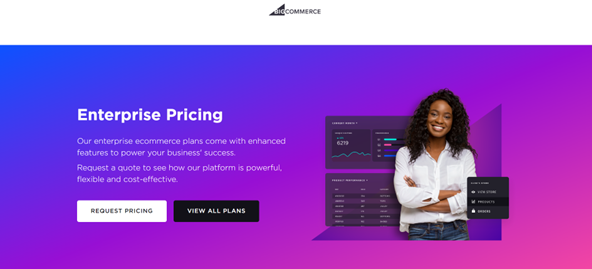
25. Volusion
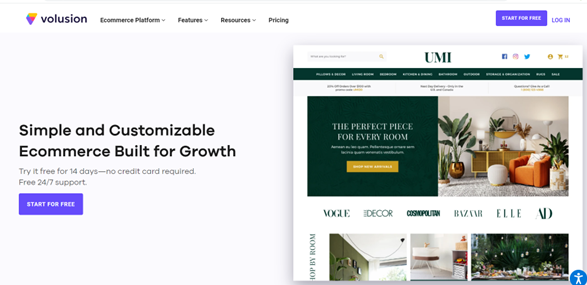
Volusion is an e-commerce platform that was created in 1999by Kevin Sproles. It was developed as a way to help small businesses easily create an online presence and sell their products online. Since its inception, Volusion has grown to become a comprehensive e-commerce platform that offers a range of features to help businesses sell products online, including customizable templates, payment gateways, and inventory management.
Pricing
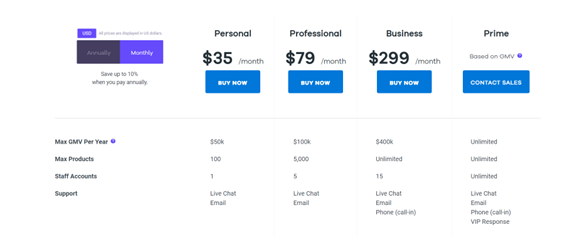
Internal communication tool
26. Zoom

Zoom is a video conferencing software that allows users to conduct online meetings, webinars, and virtual events. Zoom was invented by Eric Yuan, It was created by Zoom Video Communications, Inc. and was first released in 2013. The software has gained significant popularity since theCOVID-19 pandemic, as it became a vital tool for remote work, online education, and virtual social gatherings.
Zoom offers a range of features, including screen sharing, recording, virtual backgrounds, and breakout rooms. It also has a chat function, which allows participants to send messages to each other during the meeting. The software is available on multiple platforms, including desktop, mobile, and web browsers, and it can be used with or without an account.
Zoom remains a popular and widely used video conferencing tool for both personal and professional use.
Pricing

27. Slack

Slack is a cloud-based collaboration platform designed to facilitate communication and teamwork within organizations. It provides a centralized location for team members to exchange messages, share files, collaborate on documents, and integrate with other applications.
Slack allows teams to organize their communications into channels based on topics, projects, or departments. It also includes features such as voice and video calling, screen sharing, and a range of integrations with third-party apps like Google Drive, Trello, and Salesforce.
Slack was initially launched in 2013 and has since grown to become one of the most widely used communication platforms for businesses and organizations of all sizes. Its ease of use and flexibility make it popular among remote and distributed teams, as well as those working in traditional office environments.
Pricing

28. Calendly
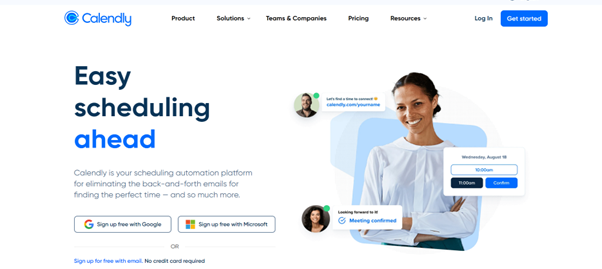
Calendly is a popular scheduling software that allows users to schedule appointments and meetings with ease. It integrates with various calendar applications such as Google Calendar, Outlook, and iCloud, allowing users to manage their schedules in one place.
Calendly offers various features, including customizable scheduling links, automatic time zone detection, reminder notifications, and team scheduling. Users can also set buffer times between appointments and sync their availability across multiple calendars. Calendly is widely used by businesses, individuals, and educators to streamline their scheduling process and save time. It offers both free and paid plans, with advanced features available for premium subscribers.
Pricing

Final Thought
Growing a business is no easy feat and requires hard work, dedication, and effective SaaS tools. Thankfully, there are many great options to choose from that can help entrepreneurs realize their dreams. The right tool will provide a solid foundation for the next stage of your business growth.
Take some time now to think about the needs of your business, the scope you want to achieve and the different tools available so you can make an informed decision on which one is right for you. With the right tool and a bit of determination, success awaits!

















